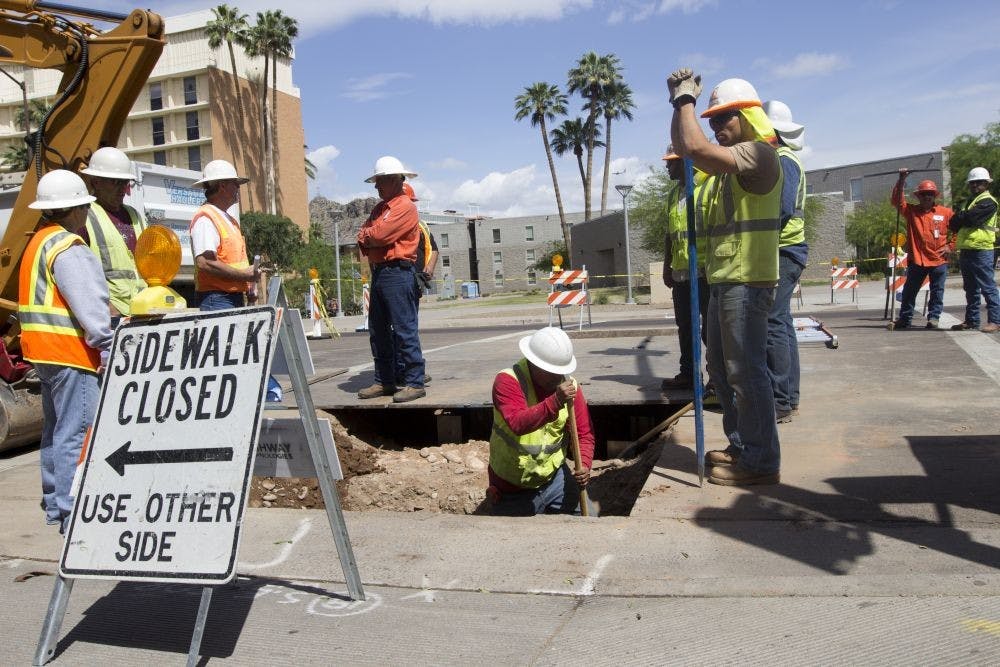Kevin and I were up and ready to go by 5:50 a.m., because the boss told us he’d pick us up at 6. We waited until 6:45, and then he finally showed up. We got to the job site by 7:30 and began working by 8. That extra 30 minutes wasn’t wasted — standard procedure, you see, is to watch the boss mingle with the site manager for a half-hour, and, believe me, the gates of a construction site don’t keep out social circles and dramatic gossip.
Anyway, during this particular day on the job, as a construction day laborer, I learned an interesting bit about the labor markets in Arizona. Perhaps it can add to the conversation about whether wages drive labor, and perhaps it can add to the conversation about our unemployment problem.
Through various amusing events, I discovered that a convoluted labor market surrounds construction work here: There are many able and willing, easy to find workers, yet contractors struggle to employ them. I witnessed this struggle first-hand.
Our job was on the roof. I was told by the boss to paint a layer of silicon paint over the entirety of the roof, and to make the layer exactly 32 millimeters thick. My coworkers were Kevin, Ruben, Guillermo and Río. I assumed Río was his nickname, but I didn’t know for sure. I met Guillermo and Río for the first time that day; the boss had picked them up on the side of the street at a Circle K.
Guillermo and Río speak only Spanish, but luckily Kevin, Ruben and I all speak Spanish, too. As it turned out, we didn’t do much speaking, but I did hear a recurring chorus that day — Ruben must have shouted “¡Río, no comes la pintura!” a dozen times. We all had disposable gloves, and, because silicon paint is a rather thick and tough substance, we were told to renew them periodically. Apparently, Río had been using his teeth to take his off, completely dyeing his mouth white in the process. So Ruben continually told him to stop eating the paint — "¡No comes la pintura!"
We all worked hard for a few hours, but Guillermo and Río randomly quit. At midday, just after the boss brought us lunch, they threw in the towel. They were good workers, and we were all getting paid a fair wage of $15 an hour, but they decided that $60 was enough for the day. Well, besides making the job a lot harder for Kevin, Ruben and I, Guillermo and Río brought the aforementioned issue to light.
The unskilled labor market in the construction business is drying up, but not for a lack of able workers.
We spoke with the boss for a few hours about the topic after the job was done, and he and Ruben apparently struggle to find a single reliable worker. This struck me, because on any given day there appears to be a line of job seekers outside every Home Depot. The boss agreed, but informed me that he rarely finds a single one that will work for two days straight — even when he bumps the hourly wage up to $22 an hour for consistent workers. Workers will jump in his truck for a few bucks in an instant, but won’t stick around for a salary.
This isn’t just a notable social study. It may be a real problem: The particular company I work for is a small-scale business and cannot survive without workers every day. Other contractors we have worked for struggle with the same problem, and they covet a reliable worker (we witnessed an immigrant who one boss picked up at a Home Depot become an owner of two cars and a mortgagor of a home over the course of two years). Take from these findings what you will, but for me it adds new dimensions to the unemployment, minimum wage and illegal immigration debates, all at once.
Reach the columnist at gheiler@asu.edu or follow @heilergeorge on Twitter.
Editor’s note: The opinions presented in this column are the author’s and do not imply any endorsement from The State Press or its editors.
Want to join the conversation? Send an email to opiniondesk.statepress@gmail.com. Keep letters under 300 words and be sure to include your university affiliation. Anonymity will not be granted.
Like The State Press on Facebook and follow @statepress on Twitter.




